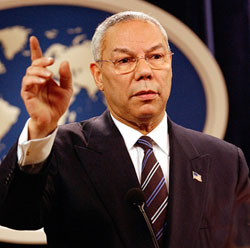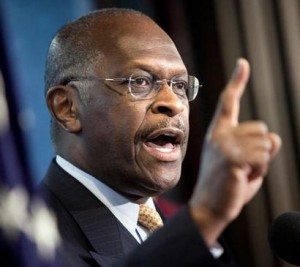 We never stop fretting over race and politics, largely because neither side of the political divide will let the subject go. Most Democrats I know are convinced that Barack Obama’s struggles are related partly to his race and anxieties over the rise of a multi-cultural power base. The accusations that Herman Cain harassed or aggressively propositioned at least four white women have stirred a new tempest, with conservative defenders of Cain suspecting race is at the bottom of the uproar, and liberals assuming that in the words of one pundit, “the layer of black sexuality” is what will kill off Cain with Republicans
We never stop fretting over race and politics, largely because neither side of the political divide will let the subject go. Most Democrats I know are convinced that Barack Obama’s struggles are related partly to his race and anxieties over the rise of a multi-cultural power base. The accusations that Herman Cain harassed or aggressively propositioned at least four white women have stirred a new tempest, with conservative defenders of Cain suspecting race is at the bottom of the uproar, and liberals assuming that in the words of one pundit, “the layer of black sexuality” is what will kill off Cain with Republicans
Powerful stuff in a climate that was supposed to be “post-racial”. It’s a vexing enough subject that absurdities are flourishing on both sides: attributing Obama’s slide to race rather than the economy ignores the color-blindness descendants of Confederate soldiers displayed In Virginia and North Carolina in voting for Obama in 2008, or for that matter, the 50% plus approval ratings Obama enjoyed in Alabama and Mississippi in the spring of 09. Is the theory that they just didn’t look hard enough at Obama’s photos? Similarly, asserting that Cain is in a predicament because of race assumes Mitt Romney would get a pass if it was discovered that multiple women at Bain Capital had accused him of harassment and that Bain had paid money to resolve the claims.
There are obvious straw-men at work here who are pretty easy to knock down. I generally agree with Ross Douthat of the New York Times, a smart, thoughtful center right columnist, who writes this week that in politics, “race matters, but ideology matters much, much more.” But I do find myself agreeing with one argument in circulation and it is worth addressing because it will matter long after Cain is done and collecting lecture fees.
Yes, Cain does inspire a special kind of loathing on the left for reasons that have something to do with his skin color. Full disclosure: I’ve been through a few of these fires, as the only black congressman who opposed Obamacare, as the rare African American politician who supports voter ID laws. I’ve seen it up close–there is a predisposition in some liberal circles to think that a black politician who deviates from the liberal line is “inauthentic” and dishonest, that he is deceptively trying to curry favor with white conservatives at the expense of his own. There is also a perverse kind of resentment that the “strategy” may work, that a black who can win conservative support can cut in line and therefore advance more quickly, that such a candidate will be spared the need to court certain power-brokers.
It’s that second point, that there is resentment at the line of advancement being unfairly cut, that touches some nerves. I will venture some observations that bite, but are hard to dispute if you are a realist. An African American former CEO who has never held elected office and has no minority support base would be a non-starter in Democratic presidential politics. Similarly, in the Democratic universe, there would be no Tim Scott or Allen West: a black politician like Scott running for Congress in a 75% white Deep South district would not make the credibility cut with Democratic donors and operatives; a new-comer like West, running in a district in a state he moved to four years earlier, would be fatally suspect with Democrats: too few “community” roots, no history with the party’s activists.
These are breakthroughs that attract notice, and the inevitability is that they will either be viewed as illegitimate or inspirational. To most liberals, they are deeply suspect: in a Politico interview, the chairman of the South Carolina Democratic Party caustically observed of Scott that “he’s someone they can roll out who is a Tea Party African American. How rare are they”? The same observation is frequently cited among Democrats as the source of Cain’s ascension. Isn’t he being dangled to prove that Tea Partiers are no racists?
My guess is that Cain perplexes liberals partly because he is such an unvarnished, unapologetic conservative who revels in gems like attributing a lack of wealth to lack of will. But my guess is that he also rankles because he refutes some hard convictions about race and politics. Not so deep down, many liberals and many African Americans suspect conservatives are racist at their core: these liberals and blacks are convinced that a black can never become a governor or senator in the South for that reason, and they assume that enthusiasm for Cain cannot be genuine. His fall, therefore, would be a basis for the purest kind of glee–relief that one was right after all.
 I’ve always wished Colin Powell had sought the presidency in 1996 or 2000 to test the sentiments of countless conservative whites who cite him as a leadership model and a genuine national hero. In the same fashion, I wish blacks had to judgethe national rise of a relatively conservative black man who would have made no special promise to expand entitlements or to grow the safety net. As much as Obama’s election meant to the country’s psyche, form has reverted too easily: a liberal black politician whom white conservatives can too conveniently despise and whom blacks and liberals can too conveniently embrace.
I’ve always wished Colin Powell had sought the presidency in 1996 or 2000 to test the sentiments of countless conservative whites who cite him as a leadership model and a genuine national hero. In the same fashion, I wish blacks had to judgethe national rise of a relatively conservative black man who would have made no special promise to expand entitlements or to grow the safety net. As much as Obama’s election meant to the country’s psyche, form has reverted too easily: a liberal black politician whom white conservatives can too conveniently despise and whom blacks and liberals can too conveniently embrace.
In that way, the return to traditional battle corners, the country’s mood looks anything but post-racial: it looks like America at our heated, polarized worst. So Obama is shrunk and the debate over the national direction is simplified to “us” versus “them”; Cain, an amiable man who is unlikely to be remembered ten years from now, is artificially enlarged to the size of aprotagonist in a racial/historical passion play.
But make no mistake: the conversation and the reasons for the fever pitch do matter. After Cain disappears, there is still astrong likelihood that more young aspiring African Americans, especially in the one party South, will run as Republicans. A lot of smart people in South Carolina prophesy that Tim Scott will run for governor eventually and run very well. Will Scott and the people who emulate him be ridiculed or treated as a sign of progress? The answer will probably tell us just how “post-racial” we have gotten.










Leave a Reply